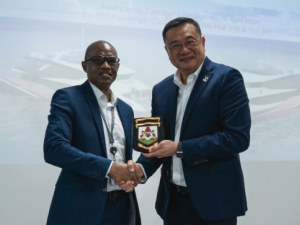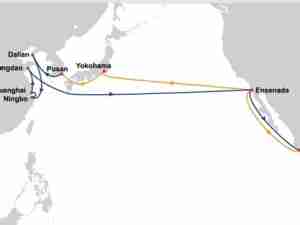Reauthorization of federal transportation legislation poses immense challenges, according to Jack Schenendorf, vice chairman of the National Surface Transportation Policy and Revenue Study Commission.
'That kind of a bill is going to be a heavy lift,' Schenendorf told a gathering of more than 200 port industry leaders April 1 at the American Association of Port Authorities spring conference in Washington.
The 2005 passage of the Safe, Accountable, Flexible, Efficient Transportation Equity Act: A Legacy for Users and the 1998 approval of the Transportation Equity Act for the 21st Century, or TEA-21, are 'going to look easy' compared with the struggles anticipated with enacting succeeding legislation to take effect by the time SAFETEA-LU expires Sept. 30, 2009, Schenendorf said.
Schenendorf said one challenge in getting approval of what he said will no doubt be the most ambitious reauthorization of the Intermodal Surface Transportation Efficiency Act of 1991, or ISTEA, will be associated with the fact that a new presidential administration and a newly constituted Congress will have just come into office as 2009 begins.
Furthermore, he said, it is vital that public confidence be restored in the program to enhance US transportation infrastructure ' especially considering that, unlike in prior years, when continuation of existing taxes could pay for the program, significant new revenues will have to be generated.
According to the study commission's report filed earlier this year, the program's annual funding level must rise from a current $87 billion to $225 billion 'for the foreseeable future.'
'We're at a crisis, and we're at a crossroads,' Schenendorf, a Washington attorney, said, cautioning that failure to fully fund massive infrastructure improvements will leave the nation with a 'second- or third-tier' transportation system. 'Without a first-tier transportation system, we won't have a first-tier economy.'
Schenendorf said all levels of the public sector, as well as the private sector, must share in the effort. Commission recommendations include increasing the motor fuel tax and other levies, adding greater flexibility for tolling and advancement of congestion-related pricing mechanisms.
Also, the commission is urging what Schenendorf described as 'Reform with a capital 'R,'' replacing 108 separate federal programs now assigned to deal with transportation issues with 10 performance-based, outcome-focused initiatives.
Areas these would cover would include restoration of existing infrastructure to a good state of repair; creation of a national freight program establishing metrics; targeting metropolitan areas of more than 1 million residents with efforts to reduce congestion by 20% by 2020; enhancing access and mobility in less-populous areas; and safety measures to reduce transportation-related fatalities by 50% by 2020.
All of the recommendations are not mode-specific, with the exception of a plan to initiate world-class, intercity passenger rail service on routes of 300 to 500 miles in length, in 15 to 20 corridors, while not reducing rail freight capacity.
In a separate presentation, John K. Veroneau, deputy US trade representative, pushed for expansion of US free-trade agreements, including pending ones with Colombia and Panama, and said the more-than-decade-old notion of the hemisphere-wide Free-Trade Area of the Americas is 'still an aspiration of ours' a goal that we still have.'
Michael Wilson, Canada's ambassador to the United States, said it is essential that nations of the hemisphere take a cooperative approach to ensuring sufficiency of trade infrastructure, commenting, 'It's imperative that we consider the entire North American space when we consider competitiveness.'
US Sen. Robert C. Byrd, D-WV, was scheduled to speak at the AAPA's April 1 luncheon at the Willard Intercontinental Hotel. However, the veteran legislator and Senate Appropriations Committee chairman was busy voting in Congress so sent Charles Kieff







